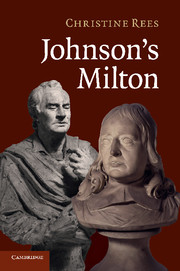Book contents
- Frontmatter
- Contents
- Acknowledgements
- List of abbreviations
- Introduction: Johnson and Milton
- PART I JOHNSON THE READER/WRITER: APPROPRIATING MILTON'S TEXTS
- PART II JOHNSON THE CRITIC: ASSESSING MILTON'S ACHIEVEMENT
- 5 ‘Phantoms which cannot be wounded’: the Lauder affair
- 6 Cutting a Colossus: Johnson's criticism of Paradise Lost
- 7 Cherry-stones: Johnson on Milton's shorter poems
- PART III JOHNSON THE BIOGRAPHER: CONSTRUCTING MILTON'S CHARACTER
- Notes
- Select bibliography
- Index
6 - Cutting a Colossus: Johnson's criticism of Paradise Lost
Published online by Cambridge University Press: 05 October 2010
- Frontmatter
- Contents
- Acknowledgements
- List of abbreviations
- Introduction: Johnson and Milton
- PART I JOHNSON THE READER/WRITER: APPROPRIATING MILTON'S TEXTS
- PART II JOHNSON THE CRITIC: ASSESSING MILTON'S ACHIEVEMENT
- 5 ‘Phantoms which cannot be wounded’: the Lauder affair
- 6 Cutting a Colossus: Johnson's criticism of Paradise Lost
- 7 Cherry-stones: Johnson on Milton's shorter poems
- PART III JOHNSON THE BIOGRAPHER: CONSTRUCTING MILTON'S CHARACTER
- Notes
- Select bibliography
- Index
Summary
So far as posterity is concerned, what sets in stone Johnson's critical opinions of Paradise Lost is his ‘Life of Milton’ in Lives of the Poets. But these lapidary verdicts are carved out of a lifetime's reading of Milton's epic: they take shape, as it were, from the continual crashing of the ocean of Johnson's mind against the Miltonic cliffs. Yet although there is something direct and elemental, even violent, in the encounter between critic and text, this metaphor images only a half-truth. Paradise Lost is not a natural phenomenon, as Johnson's own choice of metaphor emphasises. He describes Milton's colossal creation as precisely that, a Colossus cut by genius from a rock.
For a critic to tackle such a textual Colossus, the mass of material has to be broken down into separate components; and where better to start than with what welds a poem together, its versification? The fact that Paradise Lost ‘rhymes not’ had caused contention from the outset, prompting the printer to elicit a notably unapologetic apologia from the author. It is with the subject of versification that Johnson himself begins his formal criticism of Paradise Lost.
PROSODY
In the modern era, cases of alleged plagiarism like the Lauder affair can still make news headlines; it is harder to imagine any modern periodical, even a literary one, devoting a series of issues to a technical investigation of metre.
- Type
- Chapter
- Information
- Johnson's Milton , pp. 108 - 149Publisher: Cambridge University PressPrint publication year: 2010



